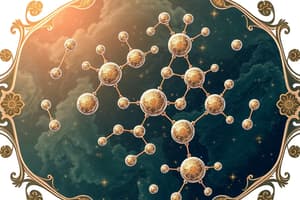Podcast
Questions and Answers
What is organic chemistry primarily devoted to?
What is organic chemistry primarily devoted to?
Compounds containing carbon atoms
What is the significance of the carbon atom in organic chemistry?
What is the significance of the carbon atom in organic chemistry?
It has a unique ability to form covalent bonds with itself and many other elements.
Why are structural formulas important in organic chemistry?
Why are structural formulas important in organic chemistry?
They convey crucial information about bonding patterns and functional groups.
What do linear chains or branched constructions represent in structural formulas?
What do linear chains or branched constructions represent in structural formulas?
What are functional groups in organic chemistry responsible for?
What are functional groups in organic chemistry responsible for?
How do functional groups aid in classifying organic compounds?
How do functional groups aid in classifying organic compounds?
What are some common functional groups in organic chemistry?
What are some common functional groups in organic chemistry?
What is the significance of stereochemistry in organic chemistry?
What is the significance of stereochemistry in organic chemistry?
What are chiral centers in organic chemistry?
What are chiral centers in organic chemistry?
Name some synthetic methodologies used in organic chemistry.
Name some synthetic methodologies used in organic chemistry.
How does mastering synthetic methodology benefit researchers in organic chemistry?
How does mastering synthetic methodology benefit researchers in organic chemistry?
Why is stereoisomerism important in fields like medicinal chemistry and pharmaceuticals?
Why is stereoisomerism important in fields like medicinal chemistry and pharmaceuticals?
Flashcards are hidden until you start studying
Study Notes
Exploring Organic Chemistry: A Fascinating World of Carbon Compounds
Organic chemistry is a captivating field within chemistry devoted to compounds containing carbon atoms, often referred to as organics due to their historical origins from living organisms. While other elements like hydrogen, oxygen, nitrogen, phosphorus, and sulfur also play essential roles, it's the carbon atom that truly sets this domain apart—thanks to its unique ability to form covalent bonds with itself and many other elements. This versatility contributes to the astonishing variety of molecules found throughout nature, medicine, materials science, and everyday life.
Structural Formulas
Central to understanding organic chemistry is the representation of molecular structures using structural formulas. Although these diagrams don’t always resemble the actual shape of molecules, they convey crucial information concerning bonding patterns, functional groups, and more. Linear chains or branched constructions serve as backbones around which different atoms are arranged, providing valuable insights into chemical behavior.
Functional Groups
Functional groups are specific arrangements of atoms within a molecule responsible for certain characteristic properties. These groupings help classify organic compounds according to their reactivity, solubility, stability, and even biological activity. Common functional groups include alcohols (-OH), alkyl halides (-X where X = Cl, Br, I), carbonyls (C=O) such as ketones and aldehydes, carboxylic acids (-COOH), and amines (-NH₂). Each type has distinct reaction pathways that make up the fabric of organic synthesis, allowing chemists to create new compounds with tailored properties and functions.
Stereochemistry
In addition to traditional aspects like structure and functional groups, stereochemistry brings another dimension to organic chemistry by exploring the three-dimensional arrangement of atoms in space. Chiral centers (also known as asymmetric carbon atoms) often exist in optically active compounds; they give rise to two non-superimposable mirror images called enantiomers. In some applications, one form may exhibit dramatically contrasting physiological effects compared to the other, making stereoisomerism an incredibly important concept in medicinal chemistry, pharmaceuticals, and related fields.
Synthetic Methodologies
Synthesizing complex organic compounds necessitates employing diverse strategies, techniques, and reactions. Some examples include electrophilic aromatic substitution, nucleophilic substitution, and acid-catalyzed condensations. Alkenes can undergo olefin metathesis or conjugate addition processes, while heteroatom functionalities like nitriles, nitro groups, and amino derivatives can participate in various transformations involving reduction, oxidation, or electrophilic attack. Mastering synthetic methodology enables researchers to navigate intricate skeletons and generate novel compounds with predictable outcomes.
For centuries, organic chemistry has been intertwined with human endeavor, flourishing through necessity and curiosity alike. By delving deeper into this vast and ever-expanding realm of knowledge, we continue to uncover exciting possibilities—innovating new therapeutics, developing sustainable polymers and materials technology, and discovering exciting facets of our natural world yet unexplored.
Studying That Suits You
Use AI to generate personalized quizzes and flashcards to suit your learning preferences.




